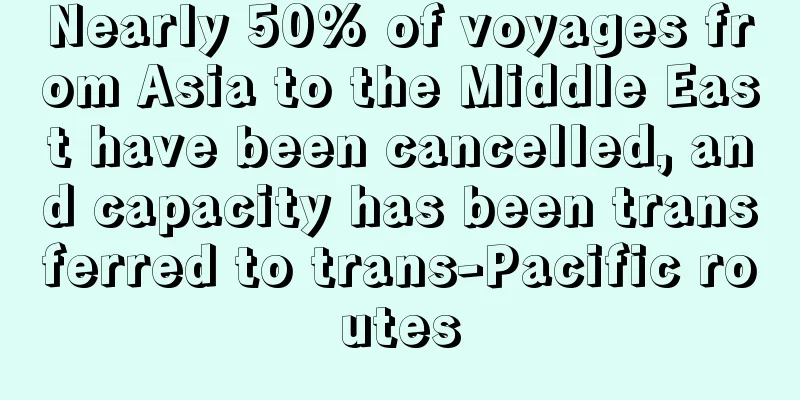Nearly 50% of voyages from Asia to the Middle East have been cancelled, and capacity has been transferred to trans-Pacific routes

|
At present, many parts of the world are preparing for the peak shopping season in November and December. The shipping market is extremely hot, there is a serious shortage of containers and cargo ships, and freight rates have soared, especially the shipping rates on the trans-Pacific route from Asia to North America have risen to "outrageous" levels.
It is understood that due to the serious shortage of container shipping capacity and the current prominent demand for trans-Pacific routes from Asia to the United States, the routes from Asia (mainly China) to the Middle East are being deeply affected. In addition, freight rates on the US West Coast routes are also at record levels. Shipping companies have canceled routes from Asia to the Middle East, with nearly half of the routes being canceled almost every week, and the capacity has been transferred to the trans-Pacific routes from Asia to the United States.
It is reported that the current freight rate from Shanghai to Jebel Ali is about US$4,000 per container , while the price of containers from Shanghai to the west coast of the United States has soared to US$20,000 per standard container! It seems that the freight rate of the trans-Pacific route from Asia to the United States is really attracting more shipping companies to join in!
As a result, not only the Middle East, but also trade markets in many parts of the world will be affected. It is reported that the coverage of routes to Asia, Africa, Oceania and Latin America has been reduced. In fact, it is not just a problem of cargo ship shortage, port congestion and timely loading and unloading of containers are also important factors affecting shipping.
Just a few days ago, there was news that in order to alleviate the country's supply chain disruption problem, the acting general manager of Nigeria's port authority is asking the country's ports to auction unclaimed containers. They call containers that stay at the port for more than 90 days after the owners unload the goods "overtime" containers.
According to the acting general manager of the Nigerian Ports Authority, there are more than 5,000 such "overdue" containers in Nigerian ports, which occupy the country's available container space. In the current situation of broken supply chains, lack of containers and shortage of cargo ships, port congestion caused by "overdue" containers will further aggravate shipping blockages and trade losses. Nearly half of flights from Asia to the Middle East cancelled More trans-Pacific routes |
>>: DHL's B2C overseas shopping platform Eshop expands into the Middle East market
Recommend
Another brand failed! Hundreds of products were recalled
Product recalls are not uncommon in cross-border ...
The opportunity to settle foreign exchange has come! The US dollar exchange rate is approaching "7" again
For cross-border e-commerce sellers, what they ea...
Walmart will hold more than 30 live broadcasts to strengthen its social e-commerce layout!
According to CNBC, Walmart will hold more than 30...
What is Haimaohui? Haimaohui Review, Features
The Overseas Trade Federation (FTF) is a cross-bo...
Valuation: 2 billion! Internet celebrity brand Allbirds will go public
When it comes to DTC brands (i.e. selling product...
30 million wasted! The big seller made a mistake in making cars
After the account blocking incident, the concept ...
What is Hangzhou Utopia Overseas E-commerce Co., Ltd.? Hangzhou Utopia Overseas E-commerce Co., Ltd. Review, Features
Hangzhou Utopia Overseas E-Commerce Co., Ltd. is ...
Sharing the cake! Kuaishou opens e-commerce functions to users in the US market
Recently, the domestic short video platform Kuais...
In 2021, Russian e-commerce developed rapidly, with transaction volume increasing by more than 90%!
According to preliminary estimates by Data Insigh...
Wayfair's fourth-quarter net loss was $202 million as international revenue declined
Recently, according to foreign media reports, the...
What is Mott & Bow? Mott & Bow Review, Features
Mott & Bow is an online store that sells jeans...
What is Wealthfront? Wealthfront Review, Features
Wealthfront is an American automated investment s...
What is mymakeupbrushset? mymakeupbrushset Review, Features
mymakeupbrushset is a global brand that focuses on...
What is Giropay? Giropay Review, Features
Giropay is an online payment method using interne...
What is iBay365? iBay365 Review, Features
iBay365 is one of the earliest cross-border e-comm...









